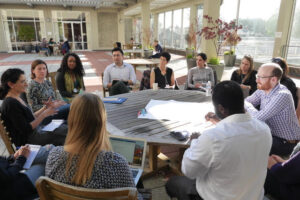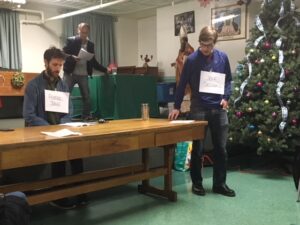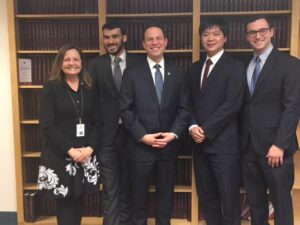The Social Justice Lawyering Clinic has been working with the Pennsylvania Domestic Workers Alliance (PDWA) to provide legal support to their organizing campaign. Domestic workers – nannies, house cleaners, and caregivers – are critical to the economy. Yet they work in a largely hidden economy behind closed doors. When subject to demanding, abusive, and exploitative conditions, they often have little power to assert their rights. To make matters worse, the laws governing the pay and conditions of workers often exempt domestic workers from basic protections. These legal exemptions reflect the history of domestic work, which includes the legacy of slavery and the relegation of household labor as “women’s work.” This fact sheet, created by Lily Austin (’20) and Carla Cortavarria (’19), summarizes how Philadelphia could enact a domestic worker bill of rights. Philadelphia’s City Council is now actively considering such a bill.
News
Protecting domestic workers
The Social Justice Lawyering Clinic has been working with the Pennsylvania Domestic Workers Alliance (PDWA) to provide legal support to their organizing campaign. Domestic workers – nannies, house cleaners, and caregivers – are critical to the economy. Yet they work in a largely hidden economy behind closed doors. When subject to demanding, abusive, and exploitative conditions, they often have little power to assert their rights. To make matters worse, the laws governing the pay and conditions of workers often exempt domestic workers from basic protections. These legal exemptions reflect the history of domestic work, which includes the legacy of slavery and the relegation of household labor as “women’s work.” This fact sheet, created by Lily Austin (’20) and Carla Cortavarria (’19), summarizes how Philadelphia could enact a domestic worker bill of rights. Philadelphia’s City Council is now actively considering such a bill.
Students Help Create Resource for Asylum Seekers
The Sheller Center collaborated with the Washington Office of Latin America (WOLA) to release The Annotated Table of Contents Project this month. The project aims to assist immigration lawyers and applicants in preparing asylum cases by providing detailed and compelling information on country conditions in the Northern Triangle, tailored to specific elements of an asylum claim. Under the guidance of Dean Ramji-Nogales, Emily Alvarez (’21), Jeff Basch (’19), Ken Bergman (’19), Carla Cortavarria (’19), Layal Issa (’20), Pretty Martinez (’20), Peter Mazur (‘18), Linh Nguyen (’19), Ashley Rotchford (’18), Sofia Sanchez Ordonez (’20), and Emily Welch (’19) collected and organized research in both English and Spanish that demonstrates government actors are unwilling and unable to protect individuals fearing persecution in El Salvador, Guatemala, and Honduras. Their research is broken into several modules that focus on information helpful to cases in which individuals fear persecution by private actors, in response to recent restrictions on those who qualify for asylum. The law students collaborated with Temple’s Department of Spanish and Portuguese to obtain certified translations for Spanish language documents, and worked with numerous individuals and organizations for whose guidance and assistance we are deeply grateful.
Students Help Create Resource for Asylum Seekers
The Sheller Center collaborated with the Washington Office of Latin America (WOLA) to release The Annotated Table of Contents Project this month. The project aims to assist immigration lawyers and applicants in preparing asylum cases by providing detailed and compelling information on country conditions in the Northern Triangle, tailored to specific elements of an asylum claim. Under the guidance of Dean Ramji-Nogales, Emily Alvarez (’21), Jeff Basch (’19), Ken Bergman (’19), Carla Cortavarria (’19), Layal Issa (’20), Pretty Martinez (’20), Peter Mazur (‘18), Linh Nguyen (’19), Ashley Rotchford (’18), Sofia Sanchez Ordonez (’20), and Emily Welch (’19) collected and organized research in both English and Spanish that demonstrates government actors are unwilling and unable to protect individuals fearing persecution in El Salvador, Guatemala, and Honduras. Their research is broken into several modules that focus on information helpful to cases in which individuals fear persecution by private actors, in response to recent restrictions on those who qualify for asylum. The law students collaborated with Temple’s Department of Spanish and Portuguese to obtain certified translations for Spanish language documents, and worked with numerous individuals and organizations for whose guidance and assistance we are deeply grateful.
Pa. Supreme Court should address ICE arrests at the courthouse
On January 30, 2019, the Sheller Center released Obstructing Justice: The Chilling Effect of ICE’s Arrests at Pennsylvania’s Courthouses. The report is authored by Patrick Gordon (’19), Kelley Grady (’19), and Shaqueil Stephenson (’19). The Philadelphia Inquirer, WHYY, and Slate cover the report, which explains how ICE arrests and court personnel collaboration with ICE has obstructed justice by instilling fears in immigrant communities about going to court. Over the course of the semester, the authors collected information from lawyers, legal services organizations, victim service advocates, and community based organizations across the state about this issue. The report not only finds incidents in 13 different counties across Pennsylvania but also details the ways in which court personnel could be involved in apprehending and arresting immigrants. In Philadelphia, Community Legal Services (CLS) has been leading the advocacy campaign with the First Judicial District.
New lead-paint bills reflect students’ proposals
2,615: that’s how many Philadelphia children show elevated lead levels (and even that may be an undercount, since Philly uses a less stringent measure than that used by other cities and the CDC). That puts us far ahead of Flint, Michigan, in terms of the number of children at risk of serious health problems.
In an op-ed last spring, Justice Lab students Liz Torres, Tony Sierzega, and Chris Lin summarized their research on lead poisoning in Philly, conducted in partnership with Community Legal Services. The students offered four common-sense recommendations for action.
Now, City Councilwoman Blondell Reynolds Brown has introduced a package of bills that would implement several of those recommendations — including an expansion of lead-safe requirements to rental apartments generally, not just those housing children age six or younger. Councilwoman Brown is in search of co-sponsors. And we’re excited about the possibility that the students’ work will help produce real results for Philly’s kids.
A twofer: Sheller Center students help bring about criminal justice reforms
“Advocates have been pleading with the Philadelphia court system to end its policy of keeping 30 percent of all posted bail — even when a defendant is acquitted,” the Inquirer noted last week. And, the article reported, the advocacy has finally succeeded: the courts have agreed to stop the practice.
Among the advocates who helped make it happen were John Farrell, Paige Joki, and Adorah Nworah, law students in the Center’s Justice Lab. Their 2017 report, The Cost of Buying Freedom: Strategies for Cash Bail Reform and Eliminating Systemic Injustice, written on behalf of Redeemed PA, took a close look at Philadelphia’s bail system. What they found was that a person charged with a crime “must pay a fee in order to pay for their freedom regardless of guilt or charge withdrawal. Thus, a person can be found innocent of a crime but be in jail for months and forced to pay the state for the privilege of having been wrongly accused.” That shocking practice is now history.
Also last week, the courts eliminated a policy that allowed for the automatic detention of people on probation who are charged with violating probation conditions or committing new offenses. More than half of those in jail in Philadelphia are there because of these “detainers,” which are often applied regardless of the severity of the alleged violation. This problem was the focus of advocacy led by the Defender Association of Philadelphia and supported by another Sheller Center team – Tracey Johnson, Liz Casey, and Liam Thomas. The implications of the change aren’t yet completely clear, but it’s a big step forward. Congratulations to the students and to Prof. Colleen Shanahan, who supervised their work.
Guest post: Nick Kato on #DebtFreeJustice
Nick Kato (2L) and Prof. Colleen Shanahan recently attended #DebtFreeJustice, a national meeting on juvenile fines and fees. Nick is part of a Justice Lab team working with the Juvenile Law Center on juvenile costs. He shares his impressions below. For more on the meeting and the issues, visit BerkeleyLaw.

In February, I attended a national convening on juvenile fines and fees at Berkeley Law School. Advocates from across the country discussed the disparate impact of court-imposed fines and fees, and how burdensome costs defeat the juvenile justice system’s rehabilitative goals. As part of a nascent but dedicated movement, advocates explored how to build off successful reforms in Philadelphia and California, including Philadelphia’s decision to stop charging parents for the cost of their children’s incarceration.
The convening was especially valuable to me as a student because it provided a glimpse into the decision-making process for various advocacy options, ranging from impact litigation to community organizing and impact litigation. Being a part of the convening left me optimistic that advocates around the country can support each other’s efforts to create a more just and rehabilitative juvenile justice system.
Skit Written by Students to Discuss Philadelphia v. Sessions with New Sanctuary Movement’s Members
Peter Hyndman (2L) and Rafaela Uribe (2L), students in the Social Justice Lawyering Clinic, worked with New Sanctuary Movement (NSM) to help support their advocacy work on Philadelphia’s “sanctuary” policies. NSM approached the Sheller Center for Social Justice seeking a partnership to address Philadelphia’s problematic and continued collaboration with Immigration & Customs Enforcement (ICE). Despite calling itself a “sanctuary city,” and even suing Attorney General Jeff Sessions over the Trump Administration’s attempts to defund “sanctuary cities,” Philadelphia’s policies have proven inadequate in protecting its immigrant residents from ICE. ICE has indiscriminately targeted Philadelphia residents––regardless of their time living in the U.S., employment status, or relationships to U.S. citizens––for removal from the U.S. A skit developed by the students helped NSM explain the lawsuit to its members.

Students Present on Non-Compete Agreements to the Office of the Attorney General
This past semester, Social Justice Lawyering Clinic students Jeff Becker (3L), Hwui Lee (3L), and Geoff LeGrand (2L) teamed up with the Fair Labor Section of the Office of the Attorney General of Pennsylvania to investigate the problem of non-competes faced by low-wage workers in Pennsylvania. A non-compete is an agreement between an employer and an employee that prohibits the employee from working for a competing employer after leaving a job. Non-competes can sometimes be lawful (e.g., to protect trade secrets). Employers, however, unlawfully use non-competes with low-wage workers to restrain their mobility.
The students’ research found that non-competes are a problem among low-wage workers in Pennsylvania. Limiting employee mobility means that non-competes help keep employee wages low by decreasing employee bargaining power. Yet the problem remains in the shadows because low-wage workers may not understand the terms and conditions of their non-competes or know that such agreements can be unlawful. The students’ analysis discusses what next steps could be taken to further investigate the extent of the problem in Pennsylvania. It also offers solutions to halt this practice, including community education, proposed legislation, and avenues for filing lawsuits against violators.

